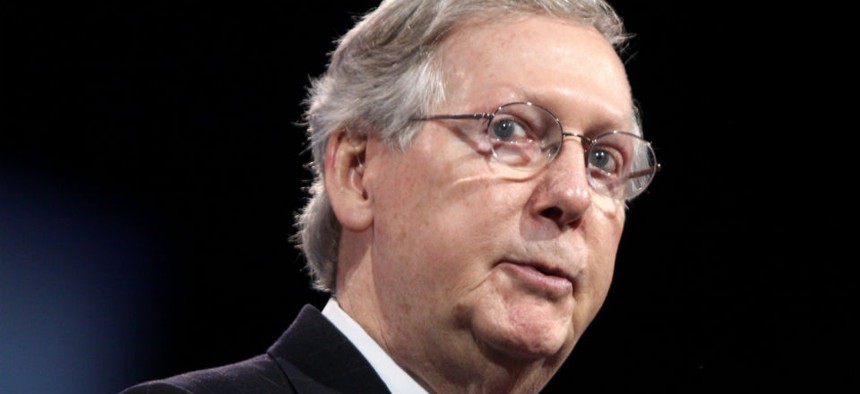Despite Promises, Path to Avoiding a Shutdown Remains Treacherous
Some lawmakers are again threatening to play political football with agency funding.
Lawmakers have a little more than three weeks to strike a deal to fund the government past mid-December, but congressional leadership has yet to carve out a clear path to reach such an agreement.
The current continuing resolution is scheduled to expire Dec. 11. With the Senate set to change leadership in January, many differing strategies have emerged for dealing with the need to pass a bill to keep the government open.
Current Senate Minority Leader Mitch McConnell, who will become majority leader in the 114th Congress, has said in no uncertain terms there will not be a shutdown.
“There is no possibility of a government shutdown,” McConnell said after his re-election earlier this month. “Remember me? I’m the guy that gets us out of government shutdowns.”
However, in a move that could sound eerily familiar to federal employees, some lawmakers have promised to attach controversial riders to any funding bill.
Rep. Matt Salmon, R-Ariz., drafted a letter last week to House Appropriations Committee leaders demanding any measure to fund the government past Dec. 11 include a provision to prohibit President Obama from taking executive action on immigration.
“If the President is intent on defying the will of Congress and the American people, then Congress must be willing use their constitutionally mandated tools to stop him,” Salmon wrote. More than 60 House Republicans have signed the letter.
Further complicating the matter for Republican leadership, highly influential conservative groups have advocated actions that could lead to a shutdown.
“President Obama’s amnesty policy was on the ballot and it was thoroughly rejected,” Heritage Action for America CEO Michael Needham recently said in a statement. “Unless Congress preempts or blocks the president’s promised executive action, a long-term funding bill is little more than a blank check for amnesty.”
The still Democratically controlled Senate would likely strip such a provision from an appropriations bill before approving it. Even if it somehow got through, it would almost certainly be met with an Obama veto. While Republican leadership has vowed to avoid a shutdown, it has conceded that it could use the threat of one to assert its political will.
“At this point, we are talking with members and developing options in case President Obama takes unilateral executive action -- action he himself has long argued exceeds his constitutional authority,” a spokesman for House Speaker John Boehner, R-Ohio, told The Washington Post.
House Majority Leader Kevin McCarthy, R-Calif., issued an ambiguous threat Friday, telling reporters, “There’s no decision on the strategy, but we know for one thing that the president should not move forward.”
McConnell reiterated at a press conference last week his promise that “we will not be shutting the government down or threatening to default on the federal debt.” His actions, however, do not match the confidence of his rhetoric; The Post also reported McConnell’s staff was circulating a memorandum to his Senate colleagues on Friday noting the political toll last year’s shutdown placed on the Republican Party.
The two-week shutdown in October 2013 also stemmed from using government operations for a political agenda, as Republicans declined to pass an appropriators bill unless it defunded the Affordable Care Act.
Initially, congressional leaders hoped to pass an omnibus funding measure to set agency spending levels through the end offiscal 2015, but Congress could instead opt for another short-term measure so the next move would be controlled by the decidedly Republican Congress.
Sen. Ted Cruz, R-Texas, the architect of the last shutdown, has advocated for such a plan, though other conservatives are not ruling out the possibility of a shutdown.
“No one wants to risk a government shutdown,” Rep. Raul Labrador, R-Idaho, told The Hill. “But this is an important enough issue that all options need to be on the table.”
Appropriations Committee Chairman Hal Rogers, R-Ky., said his colleagues are taking the wrong approach.
“I don’t want a shutdown,” Rogers said last week. “You should not take a hostage that you can’t shoot.”
(Image via Flickr user Gage Skidmore)
NEXT STORY: Government Whistleblowers Deserve Payouts Too




